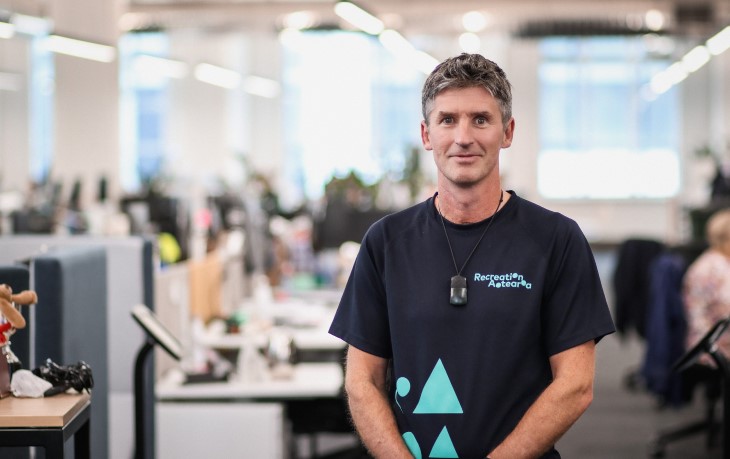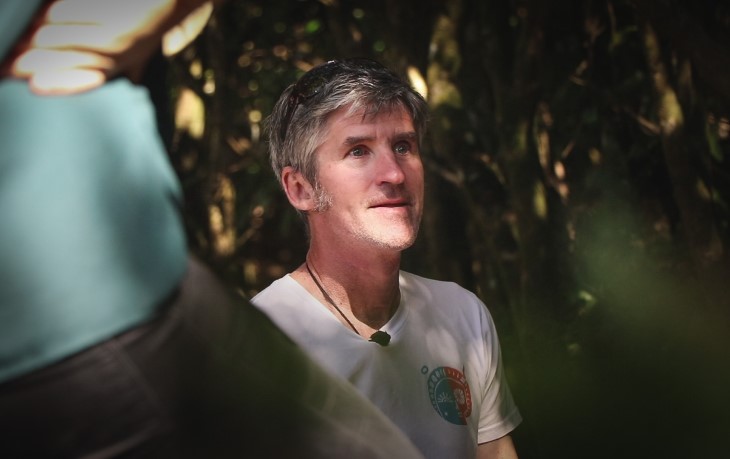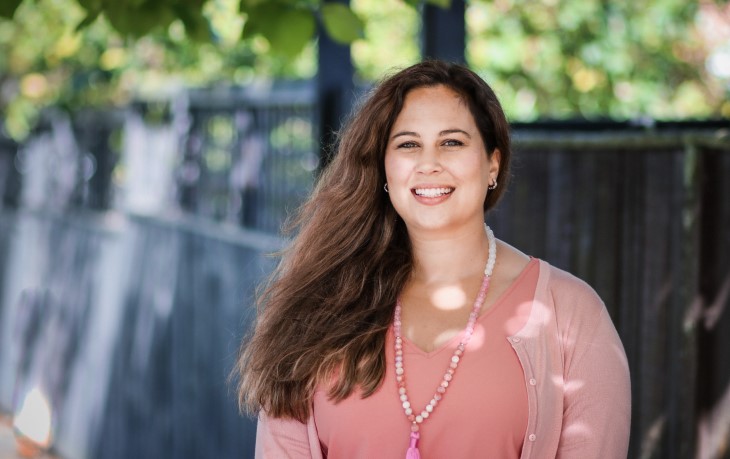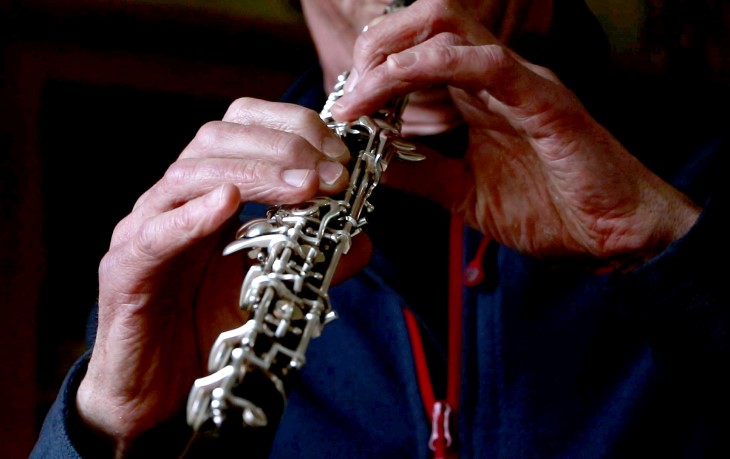Andrew’s story: How a split-second decision changed lives
Video transcript for Andrew Leslie
Visual:
Close-up of mountain bike wheel going over some dirt and branches, cuts to Andrew Leslie learning to walk on crutches. Cuts to Andrew talking to an interviewer off-screen.
Transcript:
Andrew: "I was mountain biking on Makara Peak in Wellington."
Visual:
Close-up of mountain bike going over a dirt track, cuts to Andrew learning to walk on crutches in therapy. Cuts to interviewer talking to Andrew offscreen.
Transcript:
Andrew: "There was a fork in the track. If you went left, it’s a simple bailout option, if you go right you go over the drop-off."
Visual:
Close-up from rider’s perspective of a mountain bike going through a rough forest track at speed. Cuts to Andrew learning to walk on crutches in therapy, then cuts to Andrew talking to the interviewer.
Transcript:
Andrew: "In that split-second, I instinctively went right."
Visual:
Close-up of mountain bike going over a dirt track, cuts to Andrew learning to walk on crutches in therapy.
Transcript:
Person off-camera: "Smile!"
Visual:
Andrew smiles at the camera while on his crutches, cuts to Andrew off-camera talking to the interviewer.
Transcript:
Andrew: "Went off a drop-off, and as I hit the bottom I went straight over my handlebars and landed on my head."
Visual:
Shot of a Mountain bike sailing through the air over a jump before the camera becomes crackly, cuts in and out of the bike crashing before going to black. Cuts to Andrew talking to the interviewer.
Transcript:
Andrew: "My body went completely numb, I was paralysed instantly. That’s something I have thought about a lot."
Visual:
Close-up of a bike wheel spinning freely, then cuts to a first-person shot of a rider struggling to stand after the crash with obscured vision, then cuts to a shot of a rescue helicopter coming into land and the blurred first-person perspective of the rider lying on the ground watching it come in.
A close-up shot of the chopper rotors cuts to another shot of a blurred first-person perspective.
Transcript:
Andrew: "And in those early days in hospital at night it goes over and over in your head…"
Visual:
Blurred vision shot clears to beautiful native New Zealand ferns.
Transcript:
Andrew: "…why didn’t I take that left fork in the track?"
Visual:
Andrew smiles for the camera at his workplace, Recreation Aotearoa.
Transcript:
Andrew: "Kia ora, I’m Andrew Leslie and in March 2020 I had a crash on my mountain bike and my life changed forever."
Visual:
Still of Andrew in his wheelchair in the early days at ICU. Words appear on screen. They say: Andrew was in an induced coma for a week at Burwood Spinal Unit where he spent five months recovering. He was told he may live the rest of his life in a wheelchair.
Cuts to Andrew talking to the interviewer, while the right third of the screen overlays footage of him undergoing therapy with carers at Burwood Spinal Unit.
Transcript:
Andrew: "In my time in Burwood we’re asked to set goals for ourselves…"
Visual:
Overlaid footage changes to Andrew walking on his own on his crutches.
Transcript:
Andrew: "…for me I wanted to walk out of Burwood…"
Visual:
Overlaid footage changes to Andrew walking outside with braces on his legs and just one walking stick.
Transcript:
Andrew: "…but not only be able to walk, I wanted to walk well."
Visual:
Andrew is working at his desk in front of a computer, cuts to him typing.
Transcript:
Andrew: "My injury without a doubt has a big impact on a lot of people."
Visual:
Shots of photo frames of Andrew's children at varying ages.
Transcript:
Andrew: "So clearly I’m going through a journey, but for my family and my friends they’ve equally gone through a journey as well."
Visual:
Andrew walks on crutches at the Burwood Spinal Unit, cuts back to Andrew talking to the interviewer.
Transcript:
Andrew: "From seeing me in the state I was in, in ICU, which would’ve been really scary for them, and just wondering what life was gonna be like for me."
Visual:
Andrew sits outside at his home reading, cuts to him working at home on a laptop.
Transcript:
Andrew: "To you know, to then be, you know, seeing me not being able to do the things I used to be able to do, you know, would’ve been really hard for them."
Visual:
Andrew talks to the interviewer.
Transcript:
Andrew: "I had ridden that particular track before."
Visual:
Aerial shot of the Makara Peak mountain biking track in Wellington.
Transcript:
Andrew: "At that one moment I just didn’t nail it."
Visual:
Andrew and two friends walk with him in the Makara forest.
Transcript:
Andrew: "My skills let me down in that moment."
Visual:
Words appear on screen. They say: One year on, Andrew re-visited the site of his crash for the first time. He was able to walk unassisted.
Shots cut between Andrew's mountain biking friends discussing his accident at the crash site. Cuts to Andrew crying upon his return to the site and being supported by his friends.
Andrew cries softly before exhaling.
Close-up of Andrew with tears in his eyes.
Transcript:
Andrew: "It doesn’t look like much ae, you know, it was just a bit of a rock."
Visual:
Shot of Andrew standing with his stick under a tree, and the sun pours through the trees.
Transcript:
Andrew: "Make the most of every day, because life can just change like that."
Visual:
Andrew puts his glasses on at his workplace and looks at his phone.
Transcript:
Andrew: "I don’t wanna think about what I used to be able to do that I can’t do now."
Visual:
Close-up of Andrew putting a golf ball on a tee on the green, before taking a drive shot and then looking back at the camera and smiling.
Transcript
Andrew: "I wanna keep on looking forward and thinking about what I can still yet achieve."
Visual:
The screen fades to blue. White words appear onscreen.
Prevention. Care. Recovery. ACC Logo appears with a line saying learn more at acc.co.nz.
Andrew Leslie sped down a bike track he'd ridden before – but he didn't make it to the end as planned.
A quick decision, a bit of bravado, and Andrew Leslie's life changed forever.
"As my head hit the ground, l knew instantly I was in trouble. My body went completely numb. I was paralysed instantly."
In March 2020 he dropped his daughter off at a mountain biking class and rode his own bike into Wellington's Mākara Peak mountain bike park.
He remembers what happened next very clearly: the fork in the track, flying over the handlebars, the rescue helicopter.
Andrew had damaged two vertebrae in his neck. "I couldn't feel myself on the track, so I knew I was in trouble."
It only takes a moment
During the following weeks he had plenty of time to go over what happened.
"With these types of activities, given the speed with which you're moving, you have to make split-second decisions.
"There was a fork in the track just before the drop off. If you went left, it's a simple bailout option...if you go right, you go over the drop off.
"And in that split-second, I instinctively went right because I'd been off that drop off before. Unfortunately, my skills weren't up to it at that very moment. Maybe if I had, in that approach to that fork, given it a bit more consideration around how I'm feeling in this moment..." he says.
"There's no shame in taking [the] bailout option."

Going over the handlebars
It's estimated that around 90% of injuries are preventable. Sometimes injuries happen because we're tired, in a rush, or not concentrating. Sometimes it's because we don't have the right tools for the job, or we think our skills are up to it when, perhaps in that moment, they aren't.
By reflecting for just a second, we're more likely to stay right-side up.
Andrew reflects on the moment he went over the handlebars. Lying paralysed on the ground, he had enough awareness to shout a warning to the rider behind him to avoid landing on him. That rider and others helped Andrew and called 111.
"I remember the helicopter buzzing overhead and being winched up. And the rotor, and the noise and the wind through my hair as I went up to the helicopter. It is very scary to think back on."
He was flown straight to Christchurch and had surgery 10 hours after the injury. After a week in an induced coma, Andrew woke to find New Zealand in COVID-19 lockdown Level 4.
"When I woke up the world had changed and my life had changed as well," he says from his home in Wellington, where he's the CEO of Recreation Aotearoa, an industry body for recreation professionals.
"It took a while for it to really become clear to me how much it was going to change for me and my family, and how difficult it was for my family to really get a sense of what it was going to mean for day-to-day life, given they were living in this surreal environment of a lockdown as well."
Andrew went through four months of rehabilitation at Burwood Hospital, Christchurch. To motivate himself, he pictured not only walking confidently out of hospital, but also walking the hilly streets and tracks of Wellington.
Doctors had told his family to be prepared for him to use a wheelchair for the rest of his life. But recently he walked – slowly and carefully - up the steep slope of Mt Kaukau, the most visible highpoint in the Wellington landscape.
The injury has changed not just his physical condition – medically, he's classified as a tetraplegic - but the lives of those around him too.
"My injury, without a doubt, had a big impact on a lot of people. Clearly, I'm going through a journey, but for my family and my friends, they've actually gone through a journey as well.
"From seeing me in the state I was in, in ICU, which would have been really scary for them, and wondering what life was going to be like for me, to then seeing me not be able to do the things I used to be able to do. [That] would have been really hard for them."
For his colleagues, "they didn't really know what was going on at all".
"It was that lack of information that was really hard for them, and they, equally, were concerned about what it meant for me and my job. Was I even going to be able to get back to work?"

Getting back to work 'good for my brain'
Part of ACC's support was to help Andrew achieve his goal of returning to work.
"I knew that it would be good for my brain, and I enjoy my work. Each fortnight I did slightly more hours and monitored my fatigue. We just took it as it came, with the goal that every two weeks I’d do a little bit more and a little bit more.
"But the big thing to manage was that the fatigue wasn't wiping me out so that I wouldn't be able to work the next day or be able to do the things I need to do with my family.”
ACC also helped with housing modifications such as putting in handrails at his home, orthotics (for walking), psychological support, transport support, nursing and home care assistance, and weekly compensation.
Andrew is now determined to make recreation more accessible for all New Zealanders.
"There's no point looking back on what I used to be able to do prior to my accident. I want to be focussed on what I can do and what I can still achieve here as well.”
We'd like to sincerely thank Andrew for sharing his story with us.
ACC helps over 2 million New Zealanders a year recover from injury. And we invest in injury prevention programmes to help people stay safe.





